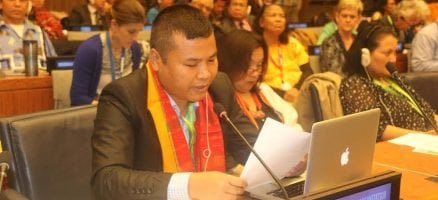In an intervention at the 16th session of the United Nations Permanent Forum on Indigenous Issues (UNPFII) taking place at the United Nations Headquarters in New York, representative of Parbatya Chattagram Jana Samhati Samiti (PCJSS) Bidhayak Chakma says, atrocities of the security forces have been intensified in Chittagong Hill Tracts (CHT).
In the joint statement of PCJSS and Bangladesh Indigenous Peoples Forum (BIPF) on Agenda Item- 4: ‘Implementation of the six mandated areas of the Permanent Forum with reference to the United Nations Declaration on the Rights of Indigenous Peoples’ delivered on 27 April 2017, Bidhayak Chakma added that human rights violation by the security forces, for instances, arbitrary arrest and detention, inhuman torture, arrest by planting arms inside victim’s house secretly, sending to jail by entangling in the false cases, vandalizing the houses including PCJSS offices and so on are now increasingly common. In 2016: fabricated cases were filed against 150 members of PCJSS and its associate organizations and innocent Jumma villagers, including seven elected people representatives; 40 members of PCJSS and innocent villagers including an elected Upazila Parishad chairman and an Union Council member were arrested; 63 members of PCJSS and villagers were detained and harassed, 99 members of PCJSS and villagers were physically tortured and, more than 150 PCJSS members were forced to flee from their home areas. Those atrocities continue in alarming extent in 2017 as well. In addition to current check posts, military forces have increased check posts across the CHT and intensified harassing people in the name checking. Very recently, army personnel, allegedly led Major Tanvir, have arrested and tortured to death a partially sight-disabled teen college student, named Romel Chakma, from Naniachor Upazila (Sub-district) in Rangamati hill district. The killing of the student by the army has sparked high tension in the CHT.
Mr. Chakma expressed that Bangladesh has been engaged with important roles at international level regarding promotion and protection of human rights. For instances, Bangladesh is one of the current members of the Human Rights Council; Bangladesh is one of the top contributor to the UN Peace Keeping Mission; and current government of Bangladesh has been awarded for its significant achievement in Millennium Development Goals (MDG). But while the UN is celebrating the adoption of the UNDRIP, the government of Bangladesh has still failed to endorse the UNDRIP, the minimum standards set for the rights of the indigenous peoples of the world. As a consequence, the UNDRIP remains a matter of complete-ignorance to the government of Bangladesh.
PCJSS representative opined that because of non recognition of the indigenous peoples of the country, failure of endorsement of the UNDRIP by the government of Bangladesh, and most importantly because of non implementation of the Chittagong Hill Tracts Accord (CHT Accord) of 1997, human rights situation in the CHT is worsening very sharply. Land grabbing, violent communal attacks, violence against indigenous women and girls committed by Bengali settlers, in most cases in collusion with security forces are common in the CHT; and in those cases, the perpetrators enjoy absolute impunity. Increasing massive political migration of the outsiders continues, and religious militancy is now in alarming scale in the CHT. With support of the civil and military administration, racist Bengali settlers’ group are active with their hatred against the process of the implementation of the CHT Accord and indigenous Jumma peoples.
He again added that albeit at international forums, current government has been vibrant in promising implementation the CHT Accord, core parts of the Accord remain unimplemented after some nearly nineteen years of signing the Accord. For instance, the CHT Land Disputes Resolution Commission Act of 2001 has been amended around eight months ago. But the government has not taken any step to enact Rules of Business for the Commission and to provide with necessary resources that are pre-requisite for the implementation of the Act.
Bidhayak Chakma urged the UNPFII, and international community, including States and the UN Agencies to encourage the Government of Bangladesh to make the CHT Land Disputes Resolution Commission functional giving priority to immediate adoption of Rules of Business of the Commission, allocation of adequate fund for the Commission, appointment of adequate manpower of the Commission, and setting up two sub-office of the Commission in Rangamati and Bandarban districts.
He also recommended to encourage the Government of Bangladesh to declare a timeframe road map for the speedy, proper and full implementation of the CHT Accord; to withdraw all temporary camps and de facto military rule ‘Operation Uttoron’ (Operation Upliftment) from the CHT, with a time limit to be announced immediately; yo rehabilitate the Bengali settlers outside the CHT with dignity for the sake sustainable solution of land disputes in CHT.
Mr. Chakma appealed government of Bangladesh to end the culture of impunity in order to ensure access to justice of indigenous peoples including protection of women and girls as per commitment of Government in the second cycle of the Human Rights Council’s Universal Periodic Review (UPR) and to take necessary measures to implement recommendations made by the UNPFII in 2011 (E/C.19/2011/6) ) in its study report on the CHT Accord, including prevention of military personnel and units that are violating human rights from participating in the UN peacekeeping operations.
The 16th session of the UNPFII starts on 24 April at the UN Headquarters in New York and continues till 5 May. Around 1,200 delegates from member states of the UN, representatives of Indigenous Peoples Organisation, Human Rights Organisations, UN agencies and academics are attending the session.
Despite representative of PCJSS, Binota Moy Dhamai of BIPF, Bablu Chakma of Kapaeeng Foundation and Nwe Oo of Bangladesh Indigenous Women’s Network are attending the event. A delegation of government of Bangladesh led by Sudatta Chakma, joint secretary of CHT Affairs Ministry is also attending the session.


